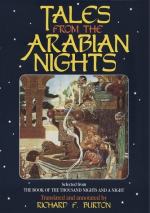[FN#203] Arab. “Bi’smi ‘llahi’ r-Rahmani’r-Rahim.” This auspicatory formula was borrowed by Al-Islam not from the Jews but from the Guebre “Ba nam-i-Yezdan bakhshaishgar-i-dadar!” (in the name of Yezdan-God—All-generous, All-just!). The Jews have, “In the name of the Great God;” and the Christians, “In the name of the Father, etc.” The so-called Sir John Mandeville begins his book, In the name of God, Glorious and Almighty. The sentence forms the first of the Koran and heads every chapter except only the ninth, an exception for which recondite reasons are adduced. Hence even in the present day it begins all books, letters and writings in general; and it would be a sign of Infidelity (i.e. non-Islamism) to omit it. The difference between “Rahman” and “Rahim” is that the former represents an accidental (compassionating), the latter a constant quality (compassionate). Sale therefore renders it very imperfectly by “In the name of the most merciful God;” the Latinists better, “In nomine Dei misericordis, clementissimi” (Gottwaldt in Hamza Ispahanensis); Mr. Badger much better, “In the name of God, the Pitiful, the Compassionate”—whose only fault is not preserving the assonance: and Maracci best, “In nomine Dei miseratoris misericordis.”
[FN#204] Arab. Majnun (i.e. one possessed by a Jinni) the well-known model lover of Layla, a fictitious personage for whom see D’Herbelot (s. v. Megnoun). She was celebrated by Abu Mohammed Nizam al-Din of Ganjah (ob. A.H. 597=1200) pop. known as Nizami, the caustic and austere poet who wrote:—
The weals of this world are the
ass’s meed!
Would Nizami were of the ass’s
breed.
The series in the East begins chronologically with Yusuf and Zulaykha (Potiphar’s wife) sung by Jami (nat. A.H. 817=1414); the next in date is Khusraw and Shirin (also by Nizami); Farhad and Shirin; and Layla and Majnun (the Night-black maid and the Maniac-man) are the last. We are obliged to compare the lovers with “Romeo and Juliet,” having no corresponding instances in modern days: the classics of Europe supply a host as Hero and Leander, Theagenes and Charicleia, etc. etc.
[FN#205] The jeweller of Eastern tales from Marocco to Calcutta, is almost invariably a rascal: here we have an exception.
[FN#206] This must not be understood of sealing-wax, which, however, is of ancient date. The Egyptians (Herod. ii. 38) used “sealing earth” ( æ ) probably clay, impressed with a signet ( ); the Greeks mud-clay ( ); and the Romans first cretula and then wax (Beckmann). Mediaeval Europe had bees-wax tempered with Venice turpentine and coloured with cinnabar or similar material. The modern sealing-wax, whose distinctive is shell-lac, was brought by the Dutch from India to Europe; and the earliest seals date from about A.D. 1560. They called it Ziegel-lak, whence the German Siegel-lack, the French preferring cire-a-cacheter, as distinguished from cire-a-sceller, the softer material. The use of sealing-wax in India dates from old times and the material, though coarse and unsightly, is still preferred by Anglo-Indians because it resists heat whereas the best English softens like pitch.




